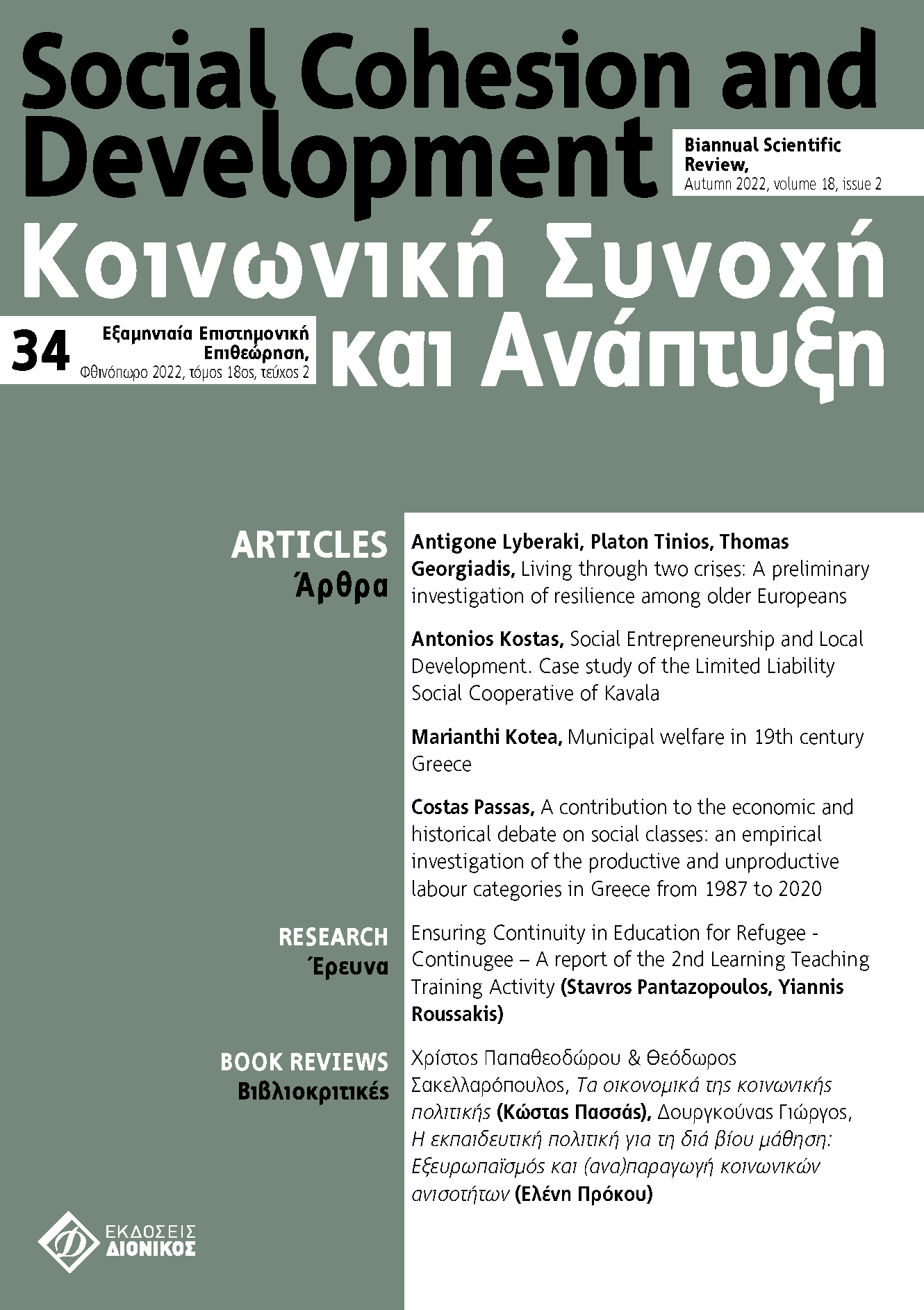Επιβιώνοντας σε δύο κρίσεις: Προκαταρκτική διερεύνηση της ανθεκτικότητας των ηλικιωμένων στην Ευρώπη

Περίληψη
Αυτό το άρθρο εξετάζει το νόημα της ανθεκτικότη-
τας στο επίπεδο της ατομικής συμπεριφοράς. Η θε-
ωρητική συζήτηση αντιδιαστέλλει τη μακρο-έννοια
με την ατομική διάσταση, προκειμένου να φωτίσει
τους τρόπους με τους οποίους η εμπειρία μιας κρί-
σης επηρεάζει την ικανότητα ενός ατόμου ή οικο-
γένειας να αντιμετωπίσει μια επόμενη. Αν η ανθε-
κτικότητα αποτελεί γενική έννοια, τότε θα πρέπει
να είναι χρήσιμη ακόμα και όταν οι αιτίες των δι-
αδοχικών κρίσεων είναι διαφορετικές μεταξύ τους
(πχ οικονομικές και επιδημιολογικές). Στο άρθρο
επιχειρούμε μια προκαταρκτική διερεύνηση, χρη-
σιμοποιώντας τη μόνη διαθέσιμη δεξαμενή ατο-
μικών στοιχείων πάνελ -την Έρευνα για την Υγεία,
τη Γήρανση και την Συνταξιοδότηση στην Ευρώπη
(SHARE) για άτομα άνω των 50 ετών. Τα πρώτα
ευρήματα υποδηλώνουν ότι τα αποτελέσματα της
κρίσης οδηγούν σε διαφορετικές κατευθύνσεις: σε
κάποιες περιπτώσεις ενισχύουν την ανθεκτικότητα
και σε άλλες το αντίθετο- την ευπάθεια. Καταλήγει
θέτοντας ερωτήματα για τους παράγοντες που προ-
διαθέτουν τις διαφορετικές επιπτώσεις.
Λεπτομέρειες άρθρου
- Πώς να δημιουργήσετε Αναφορές
-
Lyberaki, A., Tinios, P., & Georgiadis, T. (2022). Επιβιώνοντας σε δύο κρίσεις: Προκαταρκτική διερεύνηση της ανθεκτικότητας των ηλικιωμένων στην Ευρώπη. Κοινωνική Συνοχή και Ανάπτυξη, 17(2), 99–116. https://doi.org/10.12681/scad.32244
- Τεύχος
- Τόμ. 17 Αρ. 2 (2022): Νο 34
- Ενότητα
- Άρθρα

Αυτή η εργασία είναι αδειοδοτημένη υπό το CC Αναφορά Δημιουργού – Μη Εμπορική Χρήση – Παρόμοια Διανομή 4.0.
Οι συγγραφείς των άρθρων που δημοσιεύονται στην Κοινωνική Συνοχή και Ανάπτυξη διατηρούν τα δικαιώματα πνευματικής ιδιοκτησίας επί των άρθρων τους, δίνοντας στο περιοδικό το δικαίωμα της πρώτης δημοσίευσης. Άρθρα που δημοσιεύονται στην Κοινωνική Συνοχή διατίθενται με άδεια Creative Commons 4.0 και σύμφωνα με την άδεια μπορούν να χρησιμοποιούνται ελεύθερα, με αναφορά στο/στη συγγραφέα και στην πρώτη δημοσίευση για μη κερδοσκοπικούς σκοπούς και με δικαίωμα τροποποίησης μόνον με παρόμοια διανομή (αν αναμείξετε, τροποποιήσετε, ή δημιουργήσετε πάνω στο υλικό, πρέπει να διανείμετε τις δικές σας συνεισφορές υπό την ίδια άδεια όπως και το πρωτότυπο).

